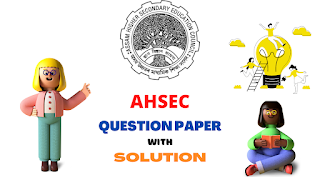ASSEB| CLASS 12| HISTORY| SOLVED PAPER - 2025| H.S. 2ND YEAR
2025
HISTORY
Full Marks: 80
Pass Marks: 24
Time: Three hours
The figures in the margin indicate
full marks for the questions.
1. Answer the following questions: (any eight) 1x8=8
(i) Who is
known as the Father of Indian Archaeology'?
Ans:- Alexander Cunningham.
(ii) Name one
Janapada.
Ans:- Panchala.
(iii) Who
composed the Allahabad Pillar Inscription?
Ans:- Harishena.
(iv) Where
was Buddha born?
Ans:- Lumbini.
(v) During
whose reign Chinese traveller Hieu-Yen-Chang visited Assam?
Ans:- King Kumar Bhaskar Varman.
(vi) Who was
the first prince of Assam to revolt against the British?
Ans:- Gomdhar (Gomdhar) Konwar.
(vii) Who authored
'Rihla'?
Ans:- Ibn Battuta.
(viii) Who
started the Virashaiva Tradition in Karnataka?
Ans:- Basavanna.
(ix) Name the
best-known woman poet of the Bhakti tradition.
Ans:- Mirabai.
(x) What is
Bell of Arms?
Ans:- It
is a room in a military barracks for storing weapons.
(xi) Name the
leader of Vietnam War.
Ans:- Ho Chi Minh.
(xii) Which
country has the longest written Constitution?
Ans:- India.
2. Answer the following questions in brief: (any eight)
2x8=16
(i) Name any
two important sites of Harappan Civilization.
Ans:- There
are two important sites of Harappan civilization:-
(i) Mohenjodaro
(ii) Harappa
(ii) What
were the two settlements of the Harappan Civilization?
Ans:- There
are two settlements of Harappan civilization:-
(i) Citadel
(Upper Town)
(ii) Lower
Town
(iii) Write
any two vows of Jain monks and nuns.
Ans:- Jain
monks and nuns have two vows:-
(i) Ahimsa
(ii) Truth
(iv) Name two
cities of ancient Assam.
Ans:- There
are two cities of ancient Assam:-
(i)
Pragjyotishpur
(ii) Shivsagar
(v) Name two
important 'Tantra Sastra' of ancient Assam.
Ans:- There
are two important 'Tantra Shastras' of ancient Assam:-
(i) Kamaratna
Tantra
(ii) Yogini
Tantra
(vi) What,
according to the historians, were the two categories of Bhakti traditions?
Ans:-
Historians classify bhakti traditions into two main categories: saguna (with
attributes) and nirguna (without attributes).
(i) Saguna
bhakti focuses on the worship of gods with physical forms such as Shiva, Vishnu
and various other gods and goddesses.
(ii) Nirguna
bhakti stresses devotion to a formless, abstract divine presence.
(vii) Who
discovered the ruins at Hampi and when?
Ans:- The
ruins of Hampi were discovered by Colonel Colin Mackenzie in the year 1800.
(viii) Name
any two types of land under Akbar.
Ans:- There
were two types of land under Akbar:-
(i) Polaj: Land
which was cultivated every year.
(ii)
Parauti: Land temporarily left fallow to restore fertility.
(ix) Who
introduced the permanent settlement in Bengal and when?
Ans:- The
permanent settlement in Bengal was initiated by Lord Cornwallis in 1793.
(x) What were
Northern Black Polished ware?
Ans:-
Northern Black Polished Ware refers to a type of luxurious, fine pottery that
developed in India during the Iron Age (about 700-200 BCE). It is known for its
shiny, black or grey polished surface and was commonly used to make bowls and
vessels.
3. Answer the following questions: (any eight) 4×8=32
(Buy E-Books to read complete solutions)
DOWNLOAD [PAGE LINK:-CLICK HERE]
***
HISTORY SOLVED PAPERS PAGE LINK - Click here
BUY E-BOOK (PDF FILE)
[TO SEE FULL SOLUTION]
(Chapter wise Notes, Exam Question Papers solved, MCQ solved) [ARTS, COMMERCE, SCIENCE]
|
DOWNLOAD PAGE LINK:-CLICK HERE |
ASSEB/ AHSEC PAGE LINK - CLICK HERE

